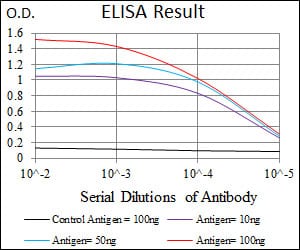
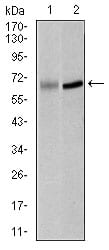
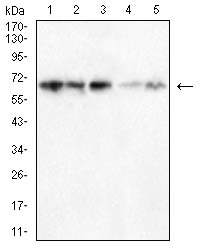
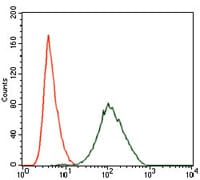
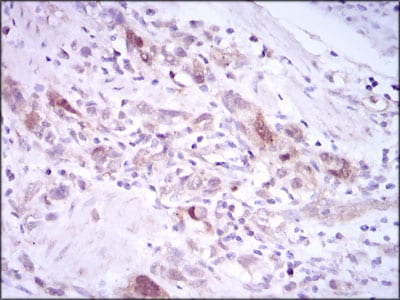
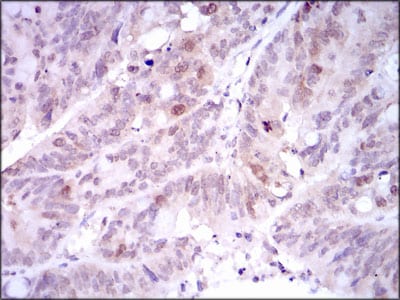
| WB | 1/500 - 1/2000 | Human,Mouse,Rat |
| IF | 咨询技术 | Human,Mouse,Rat |
| IHC | 1/100 - 1/500 | Human,Mouse,Rat |
| ICC | 技术咨询 | Human,Mouse,Rat |
| FCM | 1/200 - 1/400 | Human,Mouse,Rat |
| Elisa | 1/10000 | Human,Mouse,Rat |
| Aliases | PLK;STPK13 |
| Entrez GeneID | 5347 |
| clone | 3C11 |
| WB Predicted band size | 68kDa |
| Host/Isotype | Mouse IgG1 |
| Antibody Type | Primary antibody |
| Storage | Store at 4°C short term. Aliquot and store at -20°C long term. Avoid freeze/thaw cycles. |
| Species Reactivity | Human,Mouse,Rat,Monkey |
| Immunogen | Purified recombinant fragment of human PLK1 (AA: 331-508) expressed in E. Coli. |
| Formulation | Purified antibody in PBS with 0.05% sodium azide |
+ +
以下是3篇与PLK1抗体相关的研究文献概览,供参考:
---
1. **文献名称**:*"PLK1 as a Potential Target in Cancer Therapy"*
**作者**:Strebhardt K, Ullrich A
**摘要**:该综述探讨了PLK1在肿瘤细胞增殖和存活中的关键作用,强调针对PLK1的抗体和小分子抑制剂在癌症治疗中的潜力,包括利用抗体阻断PLK1功能以抑制肿瘤生长。
---
2. **文献名称**:*"Development of a Phospho-Specific PLK1 Antibody for Monitoring Mitotic Progression"*
**作者**:Jang YJ, Ma S, et al.
**摘要**:研究团队开发了一种特异性识别PLK1磷酸化位点的抗体,用于追踪细胞有丝分裂进程。该抗体在Western blot和免疫荧光中表现出高特异性,为研究PLK1的细胞周期调控机制提供了工具。
---
3. **文献名称**:*"Antibody-Based Inhibition of PLK1 Attenuates Glioblastoma Tumorigenicity"*
**作者**:Gjertsen BT, Erikson RL
**摘要**:通过PLK1抗体抑制其激酶活性,显著降低了胶质母细胞瘤细胞的增殖和侵袭能力,表明靶向PLK1的抗体疗法可能成为恶性脑肿瘤的治疗策略。
---
如需具体文献来源或更多研究,可进一步提供关键词或研究领域细化检索范围。
Polo-like kinase 1 (PLK1) is a serine/threonine kinase belonging to the Polo-like kinase family, playing a critical role in cell cycle regulation, particularly during mitosis. It orchestrates key processes such as centrosome maturation, spindle assembly, chromosome segregation, and cytokinesis. Dysregulation of PLK1 is linked to genomic instability and oncogenesis, with its overexpression observed in various cancers, correlating with poor prognosis. This makes PLK1 a promising therapeutic target and a biomarker for cancer progression.
PLK1 antibodies are essential tools for studying its expression, localization, and function in both normal and pathological contexts. They are widely used in techniques like Western blotting, immunohistochemistry (IHC), immunofluorescence (IF), and flow cytometry to quantify PLK1 levels in tissues or cell lines. Specific monoclonal or polyclonal antibodies enable researchers to investigate PLK1’s interaction with substrates, its activation state (e.g., phosphorylation status), and its role in signaling pathways.
In drug development, PLK1 antibodies aid in validating target engagement and assessing the efficacy of PLK1 inhibitors in preclinical models. Additionally, diagnostic applications explore PLK1 as a potential biomarker for cancer stratification. However, antibody specificity and validation remain critical to avoid cross-reactivity with other PLK family members (e.g., PLK2-4). Recent advances in antibody engineering and epitope mapping continue to enhance their reliability for research and clinical translation.
×